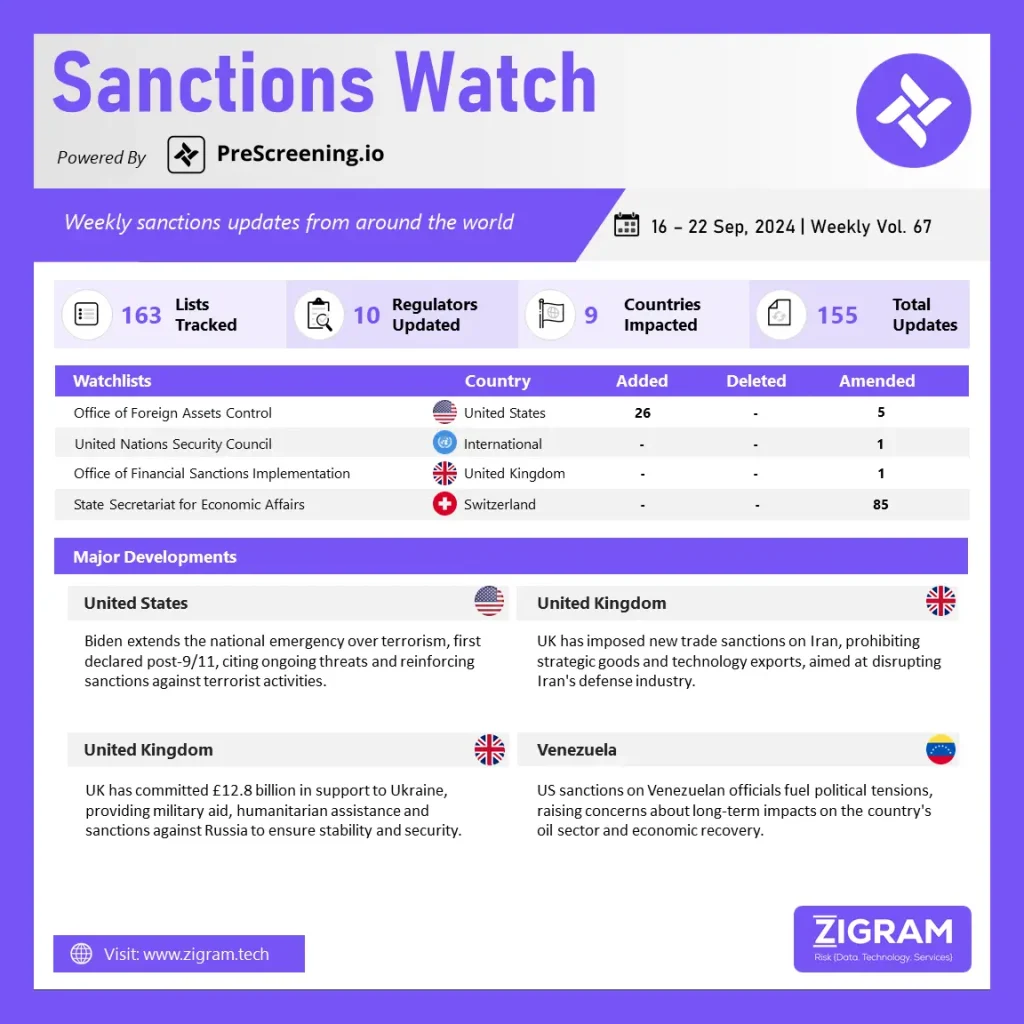Sanctions Watch Vol 67
In the latest edition of our Sanctions Watch weekly digest, we pressent significant updates on sanction watchlists and regulatory developments.
1. U.S. National Emergency Extended Amid Ongoing Terrorism Threats
Since September 11, 2001, the U.S. has been under a continuous national emergency due to terrorism threats, a status recently extended by President Joe Biden. He renewed an executive order initially signed by George W. Bush on September 23, 2001, which addresses threats posed by foreign terrorists, including those responsible for the 9/11 attacks. This order, declared under the International Emergency Economic Powers Act, emphasizes the extraordinary threat terrorism poses to U.S. national security and foreign policy. Additionally, Biden’s extension maintains sanctions established by Donald Trump to combat international terrorism.
The White House highlights that the threat persists, especially given that a record number of individuals on the terrorist watchlist have been encountered at U.S. borders since Biden took office, raising concerns about security vulnerabilities exacerbated by current border policies. Experts warn of an imminent terrorist threat, likening it to the pre-9/11 environment, while calling attention to significant apprehensions of known or suspected terrorists in recent years.
2. UK Implements New Trade Sanctions Against Iran
On September 13, 2024, the UK implemented new trade sanctions against Iran through The Iran (Sanctions) (Amendment) Regulations 2024, amending the earlier regulations established in 2023. These sanctions specifically target goods and technology deemed strategically important to the UK, as detailed in Schedule 4 of the regulations. The new measures prohibit the export, supply, delivery, or making available of these items for use in Iran, as well as the provision of technical assistance, brokering services, and financial services related to them.
By disrupting Iran’s production and supply of unmanned aerial vehicles and missiles, these sanctions are designed to exert further pressure on Iran’s defense industry. They align closely with actions taken by the UK’s international partners. However, the regulations do provide some exceptions, allowing for limited licenses under specific circumstances, as outlined in the statutory guidance.
3. UK’s Comprehensive Support for Ukraine Amid Russian Invasion
The UK has committed £12.8 billion in support to Ukraine amid Russia’s illegal invasion, including £7.8 billion for military aid and £5 billion for non-military assistance. The UK actively supports UN resolutions condemning Russia’s actions and utilizes organizations like the OSCE to hold Russia accountable. Military support includes extensive training for over 45,000 Ukrainian personnel and the provision of various military equipment. Non-military aid includes fiscal support through World Bank guarantees and humanitarian assistance totaling £457 million.
Additionally, the UK focuses on energy security, sanctions against over 2,000 individuals and entities, and funding for Ukraine’s war crimes investigations. Trade agreements facilitate duty-free digital content, while the UK also supports the integration of Ukrainians into society through accommodation and employment assistance. As of September 2024, over 213,800 Ukrainians have arrived in the UK, benefiting from various support initiatives.
4. Impact of US Sanctions on Venezuela’s Political Landscape and Oil Sector
US sanctions against Venezuelan officials aim to weaken support for Nicolás Maduro’s regime while raising concerns about the long-term impact on the nation’s oil sector. Recent sanctions target 16 officials, including members of the National Electoral Council and the Supreme Court, following Venezuela’s disputed election in July. These sanctions are designed to undermine Maduro’s institutional backing, including figures who authorized the arrest of opposition leader Edmundo González Urrutia, who has fled to Spain.
Experts, however, believe the sanctions will not immediately affect Venezuela’s oil industry, as key figures in the sector remain untouched. Diplomatic tensions, particularly with Spain, may erode investor confidence, and US legislators are considering halting all oil cooperation with Venezuela until election results are respected. Although oil production recently increased, political instability and sanctions cast uncertainty over the country’s economic recovery, with potential long-term effects on both Venezuela’s economy and the global oil market.
Know more about the product: PreScreening.io
Click here to book a free demo.
Sanctions Watch is a weekly recap of events and news related to sanctions around the world.
- #UnitedStates
- #NationalEmergency
- #TerrorismThreats
- #ExecutiveOrder
- #NationalSecurity
- #UnitedKingdom
- #Iran
- #TargetGoods
- #FinancialServices
- #DefenseIndustry
- #Ukraine
- #Russia
- #MilitaryAid
- #SanctionsWatch
- #InternationalSanctions
- #EconomicSanctions
- #RegulatoryCompliance
- #TradeCompliance
- #SanctionsEnforcement
- #SanctionsViolations
- #FinancialCrime
- #WarCrimes
- #TradeAgreements
- #Venezuela
- #OilSector
- #DiplomaticTensions
- #PoliticalInstability
